Evangelicalism, also called evangelical Christianity or evangelical Protestantism, is a worldwide interdenominational movement within Protestant Christianity that emphasizes the centrality of sharing the "good news" of Christianity, being "born again" in which an individual experiences personal conversion, as authoritatively guided by the Bible, God's revelation to humanity. The word evangelical comes from the Greek word for 'good news'.
Christianity and other religions documents Christianity's relationship with other world religions, and the differences and similarities.

The mainline Protestant churches are a group of Protestant denominations in the United States and Canada largely of the theologically liberal or theologically progressive persuasion that contrast in history and practice with the largely theologically conservative Evangelical, Fundamentalist, Charismatic, Confessional, Confessing Movement, historically Black church, and Global South Protestant denominations and congregations. Some make a distinction between "mainline" and "oldline", with the former referring only to denominational ties and the latter referring to church lineage, prestige and influence. However, this distinction has largely been lost to history and the terms are now nearly synonymous.
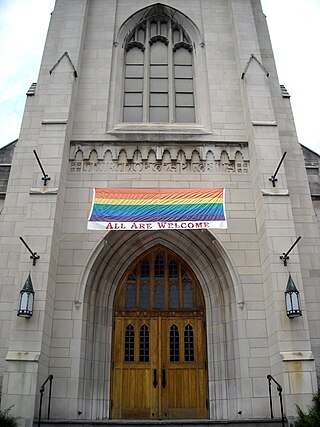
Progressive Christianity represents a postmodern theological approach, which developed out of the liberal Christianity of the modern era, itself rooted in the Enlightenment's thinking. Progressive Christianity is a postliberal theological movement within Christianity that, in the words of Reverend Roger Wolsey, "seeks to reform the faith via the insights of post-modernism and a reclaiming of the truth beyond the verifiable historicity and factuality of the passages in the Bible by affirming the truths within the stories that may not have actually happened."

James E. Wallis Jr. is an American theologian, writer, teacher and political activist. He is best known as the founder and editor of Sojourners magazine and as the founder of the Washington, D.C.-based Christian community of the same name. In 2021, Wallis joined Georgetown University as the inaugural Archbishop Desmond Tutu Chair in Faith and Justice. He also leads the Center on Faith and Justice at Georgetown. Wallis is known for his advocacy on issues of peace and social justice. Although Wallis actively eschews political labels, he describes himself as an evangelical and is often associated with the evangelical left and the wider Christian left. He worked as a spiritual advisor to President Barack Obama. He is also a leader in the Red-Letter Christian movement.

John Harwood Hick was an England-born philosopher of religion and theologian who taught in the United States for the larger part of his career. In philosophical theology, he made contributions in the areas of theodicy, eschatology, and Christology, and in the philosophy of religion he contributed to the areas of epistemology of religion and religious pluralism.
Postliberal theology is a Christian theological movement that focuses on a narrative presentation of the Christian faith as regulative for the development of a coherent systematic theology. Thus, Christianity is an overarching story, with its own embedded culture, grammar, and practices, which can be understood only with reference to Christianity's own internal logic.
Biblical literalism or biblicism is a term used differently by different authors concerning biblical interpretation. It can equate to the dictionary definition of literalism: "adherence to the exact letter or the literal sense", where literal means "in accordance with, involving, or being the primary or strict meaning of the word or words; not figurative or metaphorical".

Richard Albert Mohler Jr. is an American evangelical theologian, the ninth president of The Southern Baptist Theological Seminary in Louisville, Kentucky, and host of the podcast The Briefing, where he daily analyzes the news and recent events from an evangelical perspective.

The "New Perspective on Paul" is a movement within the field of biblical studies concerned with the understanding of the writings of the Apostle Paul. The "new perspective" was started with scholar E. P. Sanders' 1977 work Paul and Palestinian Judaism. The old Protestant perspective claims that Paul advocates justification through faith in Jesus Christ over justification through works of the Law. After the Reformation, this perspective was known as sola fide; this was traditionally understood as Paul arguing that Christians' good works would not factor into their salvation – only their faith would count. In this perspective, first-century Second Temple Judaism is dismissed as sterile and legalistic.
Edward John Carnell was a prominent Christian theologian and apologist, was an ordained Baptist pastor, and served as President of Fuller Theological Seminary in Pasadena, California. He was the author of nine major books, several of which attempted to develop a fresh outlook in Christian apologetics. He also wrote essays that were published in several other books, and was a contributor of articles to periodicals such as The Christian Century and Christianity Today.
Conservative Christianity, also known as conservative theology, theological conservatism, traditional Christianity, or biblical orthodoxy is a grouping of overlapping and denominationally diverse theological movements within Christianity that seeks to retain the orthodox and long-standing traditions and beliefs of Christianity. It is contrasted with Liberal Christianity and Progressive Christianity, which are seen as heretical heterodoxies by theological conservatives. Conservative Christianity should not be mistaken as being necessarily synonymous with the political philosophy of conservatism, nor the Christian right.
Criticism of Christianity has a long history which stretches back to the initial formation of the religion in the Roman Empire. Critics have challenged Christian beliefs and teachings as well as Christian actions, from the Crusades to modern terrorism. The arguments against Christianity include the suppositions that it is a faith of violence, corruption, superstition, polytheism, homophobia, bigotry, pontification, abuses of women's rights and sectarianism.
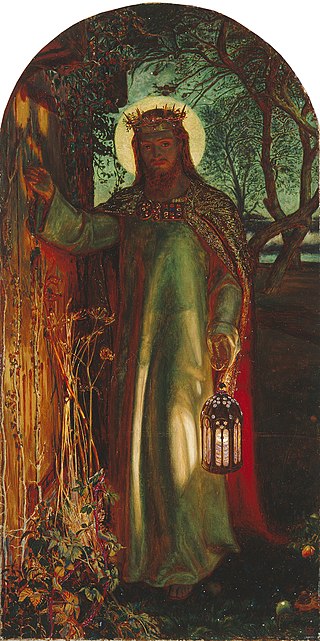
The Sinner's prayer is an evangelical Baptist term referring to any prayer of repentance, prayed by individuals who feel sin in their lives and have the desire to form or renew a personal relationship. This prayer is not mandatory but, for some, functions as a way to communicate with and understand their relationship with God through Jesus Christ. It is a popular prayer in evangelical circles. It is not intended as liturgical like a creed or a confiteor said or chanted within the Catholic Mass, but rather, is intended to be an act of initial conversion to Christianity. It is roughly analogous to the Catholic Act of Contrition, though the theology behind each is markedly different, due to the intrinsically different views of salvation between Catholicism and Protestantism. While some Christians see reciting the Sinner's prayer as the moment defining one's salvation, others see it as a beginning step of one's lifelong faith journey.
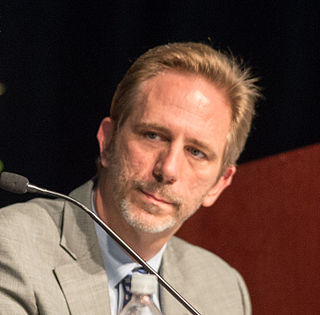
David P. Gushee is a Christian ethicist, Baptist pastor, author, professor, and public intellectual. Growing up, Gushee attended and completed his college years at College of William and Mary in 1984. After college, he received his Ph.D. in Christian ethics from Union Theological Seminary in 1993. Among the titles listed, Gushee has shown hard work and dedication in different parts of his job and was awarded for his achievements. Gushee is most known for his activism in climate change, Torture, LGBT inclusion, and Post-evangelicalism.

Christianity is the most prevalent religion in the United States. Estimates from 2021 suggest that of the entire U.S. population about 63% is Christian. The majority of Christian Americans are Protestant Christians, though there are also significant numbers of American Roman Catholics and other Christian denominations such as Latter Day Saints, Eastern Orthodox Christians and Oriental Orthodox Christians, and Jehovah's Witnesses. The United States has the largest Christian population in the world and, more specifically, the largest Protestant population in the world, with nearly 210 million Christians and, as of 2021, over 140 million people affiliated with Protestant churches, although other countries have higher percentages of Christians among their populations. The Public Religion Research Institute's "2020 Census of American Religion", carried out between 2014 and 2020, showed that 70% of Americans identified as Christian during this seven-year interval. In a 2020 survey by the Pew Research Center, 65% of adults in the United States identified themselves as Christians. They were 75% in 2015, 70.6% in 2014, 78% in 2012, 81.6% in 2001, and 85% in 1990. About 62% of those polled claim to be members of a church congregation.
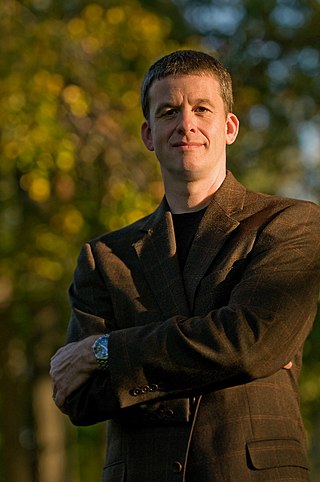
Michael R. "Mike" Licona is an American New Testament scholar, author, and Christian apologist. He is Professor of New Testament Studies at Houston Christian University, Extraordinary Associate Professor of Theology at North-West University and the director of Risen Jesus, Inc. Licona specializes in the resurrection of Jesus, and in the literary analysis of the Gospels as Greco-Roman biographies.
This is a glossary of terms used in Christianity.

The following outline is provided as an overview of and topical guide to Christianity:
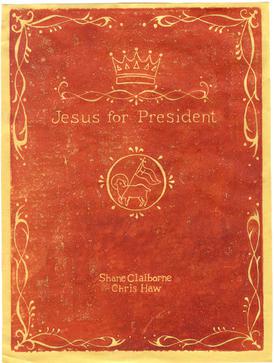
Jesus for President: Politics for Ordinary Radicals is a 2008 book co-written by the evangelical authors Shane Claiborne and Chris Haw, two important figures in New Monasticism. The book asserts that the countercultural themes in the ministry of Jesus, such as those of self-denial, are ignored by American Christians because they have become accustomed to exercising Christian privilege and are unwilling to give it up.










